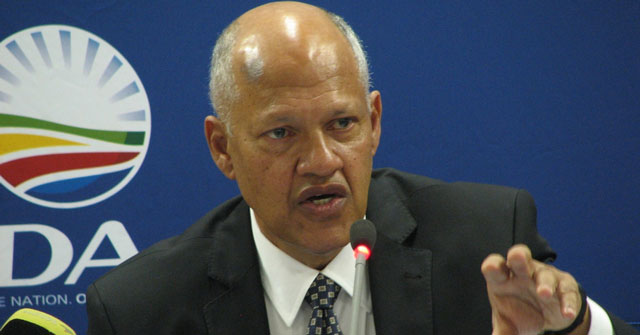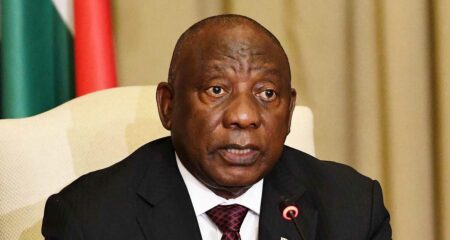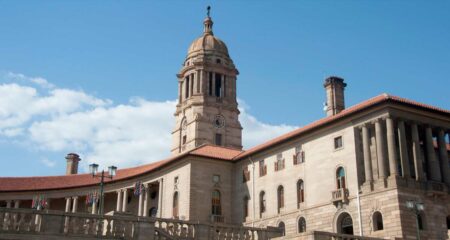
A scarce-skills allowance for teachers and specialised secondary schools for mathematics and science are among Democratic Alliance proposals to solve SA’s education crisis.
“Yes, we will overhaul the whole system. You can’t simply pass mathematics with 40%, or 33%. If you can’t get 51% in a mathematics exam, you can’t count!” DA MP Wilmot James told reporters at Parliament on Monday.
He was responding to a question on whether the DA would, should it come to power, overhaul the national senior certificate, given the criticism about the “low” percentage currently needed to pass the school-leaving examination.
“It’s absolutely ridiculous for it to sit where it is now. It’s a dumbing down of our education system, and therefore we believe that you raise the benchmark … phased in over a period of time.”
James said this would have to be coupled with an improvement in the quality of teaching.
“We are absolutely committed to raising the quality of education by raising the level of the pass mark. What might happen, in the short term, is more students might fail. So, the matric pass rate figure would drop.”
However, over time, as “stretched” targets were set for both teachers and pupils, the quality of education would improve.
“It is of the greatest importance that quality improves, because without an improvement in quality, we will not grow the economy by 8%, we will not create jobs … and so quality is the answer.”
Earlier, DA leader Helen Zille said there were “four Ts” that needed to be in place for the education system to succeed. These included good teaching; good time management, ensuring children got their full learning time; really good textbooks; and, technology. “We’ll be looking very closely at strategies to get the four Ts in place,” she said.
The DA focus on education marks the first week of the party’s national jobs campaign, with the theme “education for jobs”.
DA parliamentary leader Lindiwe Mazibuko noted that while SA had “one of the highest rates of government investment in education in the world”, with allocated spending on this reaching R207bn for the 2012/13 financial year, the system was in crisis.
The World Economic Forum recently ranked the quality of SA’s education system as 133rd in the world, out of 142 countries surveyed.
Mazibuko said the DA wanted, among other things, to introduce performance contracts for principals and their deputies, “setting academic targets for each school”.
Zille said her party would also seek to introduce regular teacher testing, as well as legislation limiting teachers’ right to strike. The latter would “include provisions requiring that terms and conditions be set through consultation and agreement between government, unions and school governing bodies before a strike can legally take place”.
The rule of “no work, no pay” should be strictly enforced, and individual teachers who engaged in violence, looting, vandalism and intimidation should be criminally charged, and their unions face severe penalties.
On matric pass levels, Zille said there was “a big unintended consequence” of the current focus on the matric pass rate.
“This fuels the drop-off rate. Schools are not keen to have pupils in matric who are not likely to pass and will bring down the school’s average. Furthermore, there is an incentive to lower the pass requirements, and there is equally an incentive to have teachers marking who will perhaps not be as rigorous as they might be.”
In effect, this meant the authorities were simply fooling themselves. “We’re pretending we’re getting improved matric results, when in fact many of the underlying factors may be militating against actually improving the outcomes.”
Zille said the drop-out rate was a much better and more reliable indicator of the quality of the education system. “If it [the drop-out rate] is going down, we’re doing something right to keep children in schools longer.”
She said SA had to get back to a point where the matric certificate really meant something.
“Because if we devalue that certificate to the point where it means nothing, we’re doing nobody a favour, especially poor kids who work hard for 12 years to try and get a piece of paper that will open doors for them in the future,” she said.
Other DA proposals include building additional classrooms at high-performing schools; instituting a nation-wide bursary scheme to help academically talented pupils from low-income families; and, speeding up the process for registration of independent schools, which would introduce more competition into the sector.
On the establishment of specialised secondary schools, Zille said these would focus on science, technology, engineering and mathematics.
The scarce-skills allowance for teachers would “supplement the salaries of teachers who possess scarce subject knowledge, or who produce excellent results in poor schools”.
This would encourage talented teachers to apply for positions in schools situated in economically disadvantaged areas, she said.
The proposals are to be included in a private member’s bill, which the DA says it will table in parliament “early this term”. — Sapa




